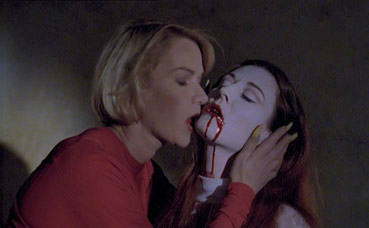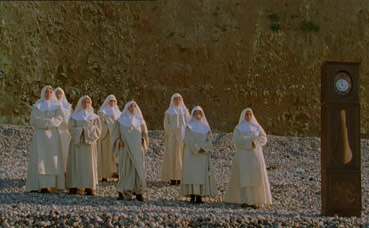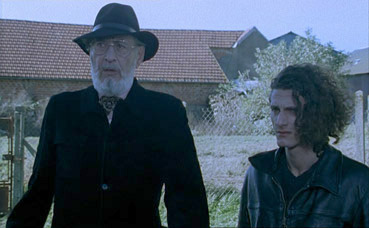|
I've always been curious about the concept of Dracula having a bride. After all, to cement such a union would technically involve marriage, a religious service traditionally executed in one of God's earthly abodes. But marriage is not exclusive to Christianity and has its equivalent in pretty much all of the popular religions, and if the devout need God's permission to sleep with the partner of their desire, then there's surely an argument for Satan to request the same of his followers. And if you're going to have a bride, then you'll first need a fiancée, right?
The vampire cinema of French filmmaker Jean Rollin is so frequently associated with the period running from late 60s to the early 80s that it's easy to forget that he's still making movies. Still making vampire movies, no less. But spiritually, Rollin never moved into the modern age. Sit down unprepared in front of Dracula's Fiancée [La fiancée de Dracula] and you'd swear it was a product of the director's heyday. Save for a brief burst of graphic violence, there's nothing here to suggest a film made as recently as 2002, and for the most part it plays as if the revisionist genre works of the 70s and 80s just passed Rollin by. For a modern audience raised on Buffy's post-modernist wisecracking and the Hollyoaks vampires of True Blood and its ilk, this may well prove a problem. But for long term Rollin fans it's rather good news.

Rollin does at least appreciate that when you give a film a title like Dracula's Fiancée then you don't need to faff about with expositional build-up. Thus when we first meet the grey-haired, spectacled and Freud-bearded Professor and his curly-topped young apprentice Eric (Denis Tallaron, a kind of French Warriors-era David Patrick Kelly) prowling around a graveyard and discussing the nightly appearance of a strange woman, we don't need to be told who they are or what their purpose is. The woman in question soon shows up and whips off her dress (it's a Jean Rollin vampire film, after all), enticed out of the darkness by jester-dressed dwarf Thibault, who's smitten to bits with her and offers his neck up for her to chomp on. But then as vampire women go, she is rather neat. This little graveyard tryst is interrupted when Eric and the Professor step in to press Thibault for information on the location of someone they refer to as The Master. And we all know who that is, don't we. No? Please refer back to the title.
Thibault isn't much help, but does point the pair in the direction of a pretty female village idiot, whom the Prof hypnotises to access the smart girl beneath. He's rather good at hypnosis as it turns out, and in a twist on an element of Stoker's original Dracula that rarely makes it into the movie adaptations, he's able to keep tabs on one character through a sort of psychic link that he sets up on a single meeting. Handy, huh? It also ties in rather well to the film's concept of vampires as semi-psychic creatures, which are known here as 'Parallels'. Anyway, the idiot girl points the Prof in the direction of Isabelle, who's earmarked to become the Master's bride-to-be. She's under the care of the Sisters of the Order of the White Virgin, nuns whose proximity to such a demonically connected woman has unhinged them a bit, but it's also made them a lot more fun than the average convent inmate. They smoke pipes and cigars, giggle and play like schoolgirls, and warm up their shivering sisters by administering a good snog. It's certainly gone onto my holiday shortlist.
After meeting up with the nonsense-talking Isabelle, the Professor hypnotises her and installs a sort of psychological alarm clock that will prompt her to leave the convent at midnight and meet up with him. When she follows the call, however, Thibault pops her in his sidecar and whips her off to meet a ruin-dwelling Ogress of his acquaintance, to whom he gives a tender human baby to chew on. I rather liked her. Trouble is, the Professor and Eric are hot on their trail and after dealing with the baby eater, they find themselves witness to a satanic ritual in which Isabelle is introduced to her future husband for the first time.

Familiar sounding elements are reshaped by Rollin's signature fondness for the erotic and the surreal, although it's partly the restraint shown with the former that give the film its late-60s feel – no full-on lesbian nunsploitation for this old genre pro. The surrealism, on the other hand, is as pronounced as ever, and ranges from the comical (the nun who wears a funnel on her head as if it were normal apparel, the mother superior's hilariously tacky crucifix cigarette lighter), to the borrowed (the skeletal bishops have more than a whiff of Buñuel about them), to the genuinely dream-like, exemplified by the beach-located cabinet clock that Dracula uses as a matter transporter.
As often with Rollin, plot takes second place to atmosphere and the staging of individual scenes, with varying degrees of success. When sister Martha offers to perform a pagan exorcism dance to help the ailing Isabelle, for example, we get to watch the whole thing, which doubtless would have looked rather suggestive back in, say, 1960, but feels a little like treading water here. The ritual to prepare Isabelle for her first encounter with Big D is an altogether more interesting affair, as vampire woman and two elderly human guardians with interesting faces terrify and murder three of the White Virgin order under the direction of a curiously androgynous but still rather horny she-wolf. The sequence artistically peaks when one of the slaughtered nuns carries her own beating heart through stone walled corridors to toss it onto a fire, the image of which is as memorable as any in Rollin's oeuvre.
Eventually everyone ends up on the same remote island location, though just how remains a mystery (Thibault and the old woman watch Isabelle depart by boat, then are somehow laying in wait when she reaches her destination), and the surrealistic pleasures are sometimes undermined by some notable misfires, including some of the most hopeless violin miming I've ever seen, and a suicide whose comes-from-nowhere abruptness ("I can't live without her!" – stab) taints a would-be dramatic moment with unintentional comedy.
Dracula's Fiancée is retrospective cinema, a 2002 film that feels as if it's dropped through a worm hole from the late 1960s, a journey it just about survives thanks to Rollin's distinctive approach to the genre. Indeed, for maximum appreciation it's best to forget the production date and just enjoy it as a Rollin vampire movie of the old school. Safe to say that those new to the cinema of this filmmaker are likely to be left a little bemused, while those familiar with his body of work will find themselves on reassuringly familiar ground, and should find plenty here to satiate their auteurist appetite.
As a more recent Rollin work it's no surprise that the transfer is better than on the UK DVD releases of some of his earlier films, and is even anamorphically enhanced, a rarity in itself. The picture is clean, sharp and with well balanced contrast, though the film and/or digital grain is a little prominent in places. Not a standard setter, perhaps, but the best material – facial close-ups fare particularly well here – are very nice indeed.

The Dolby 2.0 stereo track is clean of damage of background noise and serves the dialogue and music well enough without any distortion. Separation is clearly detectable in some of the sound effects and music.
The English subtitles are optional and are a little smaller and sharper than many, which makes them less obtrusive whilst remaining clearly legible. Nice one.
Interview with Jean Rollin: A Retrospective (20:19)
An amiable chat with Rollin in what looks like his study, bristling as it is with interesting artifacts and even a large prop that has made it into most of his films. Responding mostly in French, with English subtitles provided for us non-fluent souls, he covers some interesting ground, including how his films are funded, the process of writing scripts and novels (the latter began when during long periods of dialysis), and his tendency to favour female characters over male ones. Surprising to hear that he detested nouvelle vague cinema, but had a particular hatred for Truffaut's films. He also suggests that had he not become a filmmaker or writer, he would probably have ended up as a ticket inspector on the Metro.
Trailer (1:48)
The original French trailer with no English subs, so it's difficult to be sure if it's as odd a sell as it looks.
Stills Gallery (5:04)
A rolling gallery of production stills, set to music.
There are also trailers for four other recent Redemption releases.
Rollin continues to make films in his own unique style, seemingly obvious of, or at the very least disinterested in, how the genre he works in has evolved in the intervening years. This adds a layer of quaintness to Dracula's Fiancée that only Rollin fans will probably appreciate, making the film play more like a rediscovery from his early days than one from just seven years ago. But for the Rollin faithful it's rather heartening to see the man stick to his artistic guns, and the pleasures associated with his cinema are all there to some degree. Others may just find themselves wondering what the hell he thinks he's up to, but those are the breaks. Redemption have done well by the film, with a solid transfer and an interesting interview with the man himself.
|